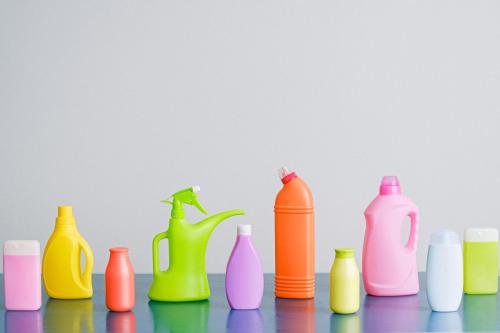Dry bulk handling equipment has firmly established itself in recent years as an integral part of plastics production and processing operations — both post-consumer recycled plastics and virgin plastics.
What do we mean by "virgin plastics?" The term refers to plastic material that is newly produced. It has not been previously used or been put through a recycling process after being used.
Additionally, the term "virgin resin plastic" is sometimes used interchangeably with virgin plastic (or as a more broad descriptor) because this is essentially plastic in its most pure form after being refined from "raw" resins.
Both names hint that the general benefits of virgin plastics stem from their purity or "newness" compared to plastics that have been recycled. The two primary benefits of virgin plastic, as you might expect, are its strength and its durability.
Let's take a closer look and find out how it compares to post-consumer recycled plastic, how it's made, and where dry bulk handling equipment gets involved.
Virgin Plastic vs. Post-Consumer Recycled Plastic
We already know that virgin plastic is newly produced plastic that has been created directly from crude oil, natural gas, etc. But what about the other side of the coin? What are post-consumer recycled plastics?
Well, the term post-consumer recycled plastics (oftentimes shortened to "PCR plastics") refers to any plastic products that are created from residential, commercial, or even industrial plastic refuse.
Comparing Virgin Plastic And Post-Consumer Recycled Plastic
Due to its purity and "newness," virgin plastic is technically stronger and more durable than post-consumer recycled plastic. In the grand scheme of things, however, when it comes to average consumer usage trends, these differences in strength and durability are actually fairly negligible.
Strength and durability aren't the only ways in which post-consumer recycled plastic seems to be overshadowed by virgin plastic. Post-consumer recycled plastic products have not been officially permitted for in the food industry - as virgin plastic is.
UN approval for PCR plastics in the food industry has not been granted yet - until the safety can be guaranteed. However, several major names in the plastics industry and waste management sector have submitted applications for UN approval and this legislation is expected to change in the near future.
The Advantages And Disadvantages Of Virgin Resin Plastic
Advantages
- Virgin plastic is the strongest and most durable form of plastic available for general consumer usage.
- The purity of virgin plastic material allows it to be safely used in the food industry.
Disadvantages
- Virgin plastic production necessitates the use of a considerable amount of fossil resources.
- Virgin plastic production leads to the significant production of CO2 emissions.
- Virgin plastic production eventually leads to the introduction of more plastic waste into our environment - with our oceans already heavily polluted by plastic waste and our landfills overflowing.
The Advantages And Disadvantages Of Post-Consumer Recycled Plastic
Advantages
- PCR plastic production uses fewer fossil resources compared to virgin plastic production.
- PCR plastic production leads to a significant decrease in CO2 emissions when compared to virgin plastic production.
- PCR plastic production facilitates the concept of a "circular economy," which leads to sustainability and a lower long-term environmental impact.
Disadvantages
- PCR plastic is not as strong or as durable as virgin plastic.
- PCR plastic is not yet approved for use in the food industry due to strict food safety regulations
- Certain colors and transparency levels are difficult to obtain without proper sorting and dry bulk handling systems.
- A considerable amount of upfront time and funding needs to be invested into the handling and sorting of the plastics before they can be recycled.
How Is Plastic Made?
1. Refinement Of Raw Materials
The plastics that we use on a daily basis can be made from several different types of raw materials, such as natural gas and coal; however, presently most of them are produced from crude oil.
Crude oil is a relatively complex combination of compounds - many of which are not relevant to the production of plastics - so it needs to be properly refined before it can be usable.
During the refinement process, the crude oil is converted into various petroleum-based products but the most important ones for plastic production are ethane and propane.
2. Heat Treatment
Once the ethane and propane have been collected from the refinement process, they are then subjected to a process called "cracking".
Cracking is often referred to as a type of heat treatment and although this isn't necessarily incorrect, the process usually also involves high pressure and sometimes a catalyst as well.
Steam cracking utilizes high temperature and pressure to break down the aforementioned hydrocarbons (ethane and propane). Conversely, catalytic cracking occurs at a relatively lower temperature and pressure due to the use of catalysts.
The end result is that the ethane and propane are converted into the monomers ethylene and propylene.
3. Polymerization
During the polymerization process, the monomers ethylene and propylene are converted into usable polymers. For example, ethylene would be converted into polyethylene and propylene would be converted into polypropylene.
It is however worth mentioning that there are two types of polymerization that are utilized in the plastics industry - addition polymerization and condensation polymerization.
In general, addition polymerization is used to produce polymers such as acrylic, rubber, and also the aforementioned polyethylene and polypropylene. Condensation polymerization, on the other hand, is used to produce polymers such as nylon, polyester, and Kevlar.
4. Extrusion, Cooling, And Cutting
These final three processes can be grouped under the broad heading of "plastic fabrication" and they all involve getting the plastic into its final usable form.
First, the melted polymer is fed into an extruder in an effort to shape it into a uniform and continuous shape. In most cases, this means that the polymer is pushed into a pipe-like apparatus so that it takes the shape of a long tube. The plastic is simultaneously cooled so that it can be more easily shaped and molded.
Finally, the plastic is then cut (usually into small pellets) so that it can be packaged more efficiently, shipped more easily, and eventually be fashioned into various plastic products as needed.
Dry Bulk Handling Equipment in Virgin Plastic Production
It is a well-known fact in the plastics industry that dry bulk handling equipment can be found in virtually every step of the plastic production process. This is true for both virgin plastic production and post-consumer recycled plastic production - dry bulk handling equipment is an essential building block of these processes.
Examples Of Dry Bulk Handling Equipment In Virgin Plastic Production
- Specialized conveyors are used to move the polymer "fluff" (powder) during the production process. These conveyors need to be calibrated so that they are both precise and efficient to avoid any loss of the polymer fluff. This is especially important due to the lightweight and delicate nature of the polymer fluff.
- Bulk bag fillers are vital in packaging the small plastic pellets that are shipped off and further refined into plastic products. Not only are bulk bag fillers low-cost solutions, but they are also flexible enough to be utilized in both semi-automatic and automatic systems. Bulk bag fillers remove the risk of human error and fatigue, which in turn expedites the packaging process and reduces waste.
Dry Bulk Handling Solutions From ETS
Although the global community is now gradually using more PCR plastic, however, there is still a place for virgin plastic in this day and age.
PCR plastic still hasn't been approved for use in the food industry on a large enough scale (although changes have been happening gradually), leaving virgin plastic as the only option in this regard. Virgin plastic material also has blended applications, meaning that it can be used to reinforce or strengthen PCR plastics.
In any case, plastics are an integral part of our modern world and this isn't going to change anytime soon. Whether you're dealing with virgin plastic or PCR plastic, Erie Technical Solutions unfailingly produces custom designs for bulk handling solutions that can keep up with the times and your production schedule.
So don't wait, contact Erie Technical Solutions and start streamlining your production process today!

